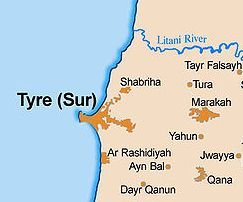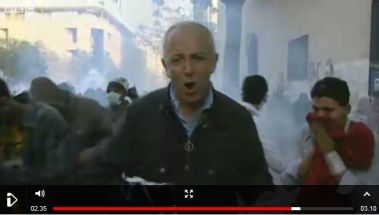 Everything you need to know about today’s coverage of Israel and the Mideast.
Everything you need to know about today’s coverage of Israel and the Mideast.
Church officials aren’t happy about the PA and UNESCO playing politics over Christian holy sites. Israeli pink washing’s an issue at the NY Times. And why is David Landau praising Bibi’s drum-beating as “tactically impeccable?”
Don’t miss the daily Media Cheat Sheet at Backspin, HonestReporting’s blog.
Iranian Atomic Urgency
• Here’s a pleasant and unexpected surprise: Russia agrees with Israel, the US and UK that the Mideast can’t be made into a nuclear weapons-free zone in the absence of regional peace. AP writes:
. . . Moscow’s decision to join Washington and London in the joint statement of support for Israel’s view was a rare nod from Moscow recognizing Israel’s security concerns.
“While Nuclear Weapon-Free zones improve the security of the entire international community, they do not exist in isolation from other security factors,” said the statement which was shared with The Associated Press. Any such zone, it said must see “the states in the region united in their aspiration to provide for strengthened regional stability and security.”

• David Landau (!) gives a unexpected shout-out to Bibi from the pages of the Sydney Morning Herald:
Many Israelis, by no means all groupies of Netanyahu, know exactly where he is coming from in this fraught and frightening saga. And they feel the same way he does. They still hope the world collectively will act to neutralise this threat, but if it doesn’t, they believe Israel must use its considerable military power . . .
Of course, Netanyahu’s drum-beating is intended to ensure that moment never comes. The fear of Israel going it alone is intended to instil anxiety and urgency into international sanctions against Tehran. Sanctions, rigorously applied, can still work.
Washington is urging its allies, Australia among them, to join in a new round, targeting Iran’s banking and petrochemical industries, as well as its nuclear ambitions. The regime in Tehran is deeply unpopular and may yet implode. Netanyahu’s drum-beating is tactically impeccable.
• David Makosky on Israel and the pace of international sanctions:
If Barak is to be believed, little time remains for sanctions to have the necessary effect. Indeed, the potency and timing of new sanctions are inversely related to the probability of an Israeli military strike. Israel will presumably try to determine whether the latest sanctions are likely to succeed before it loses its ability to attack. And if the window for a strike will close by next fall, waiting until late 2012 to impose even tougher sanctions would already be too late for Israel . . .
Israelis may therefore interpret the latest signs of hesitation — namely, the U.S. and IAEA failure to fully sanction the Central Bank of Iran — to mean that the clock has virtually run out. If so, this would break the deadlock among the Israeli political and military elite over whether sanctions obviate the need for military action.
If it makes you sleep any better, this Washington Post staff-ed decries the latest sanctions as “half-steps.”
By holding back on such measures, the Obama administration merely makes it more likely that drastic action, such as a military attack, eventually will be taken by Israel, or forced on the United States.
Peace Process

• In all the talk about Palestinians taking over West Bank holy sites with UNESCO’s cover, one voice has been overlooked. Church organizations are also squirming at the thought of a PA takeover. Anav Silverman (Huffington Post) writes:
Franciscans in charge of Bethlehem’s holy places do not want UNESCO to designate Christian shrines in the city as Palestinian World Heritage Sites. Father Pierbattista Pizzaballa told the Italian bishops’ news agency, SIR, that the Greek Orthodox and Armenian patriarchates have asked the Palestinian Authority to exclude the Church of the Nativity from the UNESCO application. “The holy places may be used for political reasons . . . we do not want to be exploited for issues in which the holy places must not be involved,” Pizzaballa was quoted as saying.
The Catholic Franciscans fear that UNESCO recognition will make it difficult for the church to run the holy sites because the sites would be under the jurisdiction of UNESCO and would have to abide by the agency’s rules.
• Palestinian sources tell AFP that tomorrow’s Abbas/Masha’al unity talks in Cairo will go on as scheduled, despite the Egyptian upheaval. So if you’re a foreign journo, what would you prefer to cover?
• Haaretz assesses Jordan’s rapprochement with Hamas. Meanwhile, the NY Times says the winds are blowing Hamas’s way.
• Benny Avni‘s six reasons why Israel’s giving Gaza rockets a free pass for the time being:
- International law and Judge Goldstone favor terrorists hiding among civilians.
- A ground op could distract the world from Iran.
- A ground op could force Abbas to move closer still to Hamas.
- A ground op could have a violent spillover effect along the Sinai border.
- A ground op would make Israel an Egyptian election issue.
- Libyan arms in Gaza.

Arab Spring
• How can Damascus object to foreign intervention? Assad’s already using it. Tariq Alhomayed (Asharq Al-Awsat) sharply points out:
The al-Assad regime has used Iran in several areas, including receiving special equipment for espionage and the knowledge of its experts, apart from weapons and more of course. Likewise, the al-Assad regime is also using the capacities of Hezbollah, whether inside Syria or even in Lebanon, in the pursuit of Syrian opposition members, and hindering the activities of young Syrian refugees in Lebanon. The al-Assad regime is also using the support of the Iraqi government, and the Sadrist fighters who are flocking to Syria. There is evidence to confirm this, including what I have heard from several Arab apparatuses, which have supplied their foreign ministers with such information.
This is not all of course, there are also Russian ships anchored off Syria, and they are certainly not there to transport Russian tourists.
• A UN human rights committee (not to be confused with the Human Rights Council) condemned Syria. More at Haaretz.
• Pearls of wisdom from The Economist:
Thanks to military conscription, most male Syrians have a basic knowledge of firearms.
• The MSM (Financial Times and now Reuters) is taking note of Spengler‘s alarm bells about Egypt’s economy going down the tubes. He also forecasts a shrinking Turkish economy:
That will deflate the neo-Ottoman balloon that Erdogan has been floating . . .
• BBC‘s Jeremy Bowen was overcome by tear gas in Tahrir Square. I get the feeling he wouldn’t have been so blase had it been fired by Israeli soldiers. Click below to watch.
• Andrew Reynolds (NY Times) says Egypt’s upcoming elections are inherently doomed to fail:
The election is likely to fail, not because of vote-stealing or violence, but because the rules cobbled together by Egypt’s military leaders virtually guarantee that the Parliament elected will not reflect the votes of the Egyptian people . . .
The result is an election that will overrepresent the larger parties while shutting out smaller ones, marginalize Coptic Christians and progressives and consign millions of Egyptians to voting for losers through an overly complicated process that combines proportional representation with majoritarianism and an antiquated quota system.
• I liked Tony Karon and the WSJ‘s take on Egyptian developments.
• Bahrain admits excessive force was used against summer protesters. According to the Daily Telegraph, the monarchy is undertaking to
- prosecute security officers
- criminalize all forms of torture
- establish a human rights body
It’s certainly an effort to pre-empt criticism from an independent inquiry due to release its findings today.
• Libya’s new Prime Minister unveiled an overwhelmingly secular cabinet. The Guardian calls it a snub to prominent Islamists.
Rest O’ the Roundup
 • A NY Times op-ed weighs in on Israel and “pinkwashing.” It’s a simplistic idea blocking the gay-lesbian community from crediting Israel’s liberal record on gay rights as it means taking away the moral high ground from the Arabs.
• A NY Times op-ed weighs in on Israel and “pinkwashing.” It’s a simplistic idea blocking the gay-lesbian community from crediting Israel’s liberal record on gay rights as it means taking away the moral high ground from the Arabs.
Increasing gay rights have caused some people of good will to mistakenly judge how advanced a country is by how it responds to homosexuality.
In Israel, gay soldiers and the relative openness of Tel Aviv are incomplete indicators of human rights — just as in America, the expansion of gay rights in some states does not offset human rights violations like mass incarceration. The long-sought realization of some rights for some gays should not blind us to the struggles against racism in Europe and the United States, or to the Palestinians’ insistence on a land to call home.
See my response to Schulman.
• There was a big explosion in southern Lebanon overnight. According to the Daily Star, the blast was likely at a Hezbollah weapons cache:
The source said the cause of the blast, which was heard shortly before midnight, could not be determined due to the heavy security blanket that was thrown by Hezbollah.
Attempts by Lebanese security forces to reach the scene so far failed as Hezbollah members created a one-kilometer radius security zone around the explosion site between Siddiqin and Deir Ames, the source added.
That’s an area near Tyre. According to UN Security Council Resolution 1701, Hezbollah’s not supposed to have any weapons south of the Litani River. Bad boys, indeed. Channeling his inner Debka File, Richard Silverstein, says the blast is the work of Israeli military intelligence.

• The Times of London picks up on the Israeli media backlash over new libel laws.
• Best buried Down Under: ABC News (Australia) gave a soapbox to some ridiculous allegations.
(Image of David Landau via Wikimedia Commons/Gila Brand; map of Lebanon via Wikimedia Commons/Thomas Blomberg; soldiers via Flickr/Israel Defense Forces)


